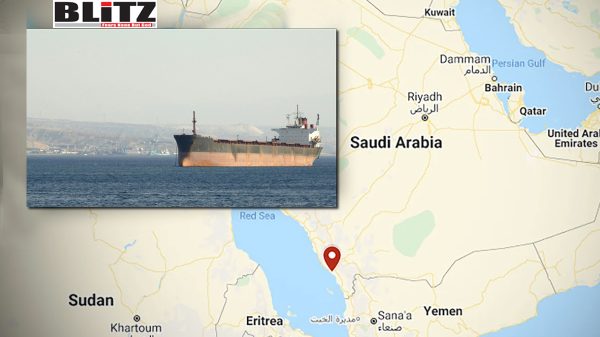Ships fake Russian, Chinese links to avoid Red Sea and Gulf attacks
- Update Time : Sunday, June 29, 2025

In a striking display of global maritime insecurity, vessels transiting the Red Sea and Persian Gulf are resorting to deception-broadcasting false affiliations with Russia and China-to protect themselves from mounting threats in one of the world’s most strategically vital waterways. A recent report by maritime risk analytics firm Windward, cited by Reuters, reveals a disturbing new trend in which ships are manipulating their identities to avoid becoming targets in a conflict that has increasingly blurred the lines between state actors and proxy forces.
Between June 12 and 24, Windward tracked 55 vessels that sent 101 atypical identity messages such as “China owned” or “Russian crude.” These signals-broadcast over automatic identification systems (AIS)-are part of a deliberate strategy to confuse attackers and distance vessels from perceived Western or Israeli affiliations. Examples include a Panama-flagged ship en route to Pakistan that transmitted “PKKHI all Chinese,” and a Singapore-flagged vessel that declared “Vsl no link Israel.”
These unconventional broadcasts mark a clear deviation from standard maritime protocol. Normally, vessels relay neutral terms like “For Orders” or operational notices such as “Armed Guards on Board” when navigating high-risk areas. However, following Israel’s recent strikes on Iranian nuclear facilities and Washington’s implicit backing of Tel Aviv, fears of reprisals have surged. The ripple effect is evident: non-standard messages have spread from the Red Sea to the Persian Gulf, reflecting how quickly regional conflict has reshaped global maritime conduct.
Iran’s latest posturing has intensified the anxiety gripping commercial shipping in the region. On June 23, the Iranian parliament approved a measure to potentially close the Strait of Hormuz-a narrow chokepoint through which roughly one-fifth of global oil supply flows-if the United States aids Israel in future attacks on Iranian nuclear sites. While the Supreme National Security Council holds the final authority on such decisions, the signal was clear: Tehran is prepared to retaliate against any perceived collaboration with its adversaries.
This threat is far from empty. Iran commands extensive military resources in the region, including the Islamic Revolutionary Guard Corps Navy (IRGCN), which has previously detained foreign-flagged ships and harassed Western naval vessels. The potential closure of the strait, even temporarily, could provoke a major global energy shock, paralyzing oil exports from the Persian Gulf and dramatically spiking energy prices.
Exacerbating the instability is the Iran-backed Houthi movement in Yemen. Since late 2023, the Houthis have launched a series of drone and missile strikes targeting commercial vessels in the Red Sea, citing solidarity with Palestinians during the Israel-Gaza conflict. Although US President Donald Trump brokered a tentative ceasefire in May by promising a pause in Western airstrikes, the Houthis have since declared that US ships remain fair game should Washington support further Israeli aggression against Iran.
This hybrid warfare-a blend of ideology, proxy militancy, and asymmetric maritime disruption-has effectively militarized one of the world’s most heavily trafficked sea lanes. The result: shipping companies are scrambling to obscure their true ownership and operational details in a bid to avoid entanglement.
“The perception among shipowners is that due to the convoluted nature of shipping, it’s hard to know or ascertain clearly a chain of ownership to nationalities which may be under higher threat-namely the UK, US, and Israel,” said Ami Daniel, CEO of Windward. In a sector notorious for shell companies, flag-of-convenience registries, and opaque ownership structures, this ambiguity is now being exploited as a survival tactic.
Ironically, while Western ships attempt to blend in by mimicking Chinese and Russian identities, Moscow has long been accused of operating its own covert “shadow fleet” to bypass sanctions. Both the United States and European Union have cracked down on these clandestine operations, accusing Russia and its allies of using unsanctioned tankers to move oil without relying on Western insurance and regulatory oversight.
In May, the EU blacklisted 189 additional vessels, bringing the total number of sanctioned ships to 342. These include vessels flagged in Panama, Liberia, and other nations known for lax maritime oversight. A new package under discussion could see a further 77 ships added to the blacklist.
Russia has dismissed these sanctions as illegal and provocative. Nikolay Patrushev, a top aide to President Vladimir Putin, recently warned that Western restrictions on Russian maritime activity constitute “de facto acts of piracy.” He suggested that NATO interference in Russian shipping lanes amounts to a “naval blockade,” vowing that Moscow would not hesitate to deploy its navy to defend its commercial fleet.
Taken together, the trends paint a picture of an increasingly lawless maritime domain. As states and non-state actors weaponize commercial transit to pursue geopolitical objectives, shipping companies find themselves caught in a dangerous crossfire. The use of false AIS messages, while understandable as a defensive measure, may further complicate efforts to ensure navigational safety and transparency.
Worse still, the normalization of such tactics could erode the integrity of global maritime norms. If all vessels begin broadcasting disinformation to avoid detection or attack, the ability of regulators, insurers, and port authorities to track and verify ship activity will be severely undermined. This, in turn, could facilitate not only evasion of sanctions but also illicit arms trafficking, smuggling, and piracy.
What began as a localized proxy conflict is rapidly metastasizing into a full-blown maritime crisis. With Iran threatening to close the Strait of Hormuz, the Houthis continuing to target Red Sea vessels, and both sides leveraging asymmetric tactics, the region has become a geopolitical powder keg. In response, commercial shippers are resorting to digital camouflage, disguising their identities in hopes of navigating a sea littered with risk.
But in the long run, such evasive tactics are unsustainable. Without a concerted diplomatic effort to deescalate tensions and restore safe passage in international waters, global trade will continue to bear the cost-measured not only in higher freight rates and insurance premiums, but in the erosion of maritime order itself.











